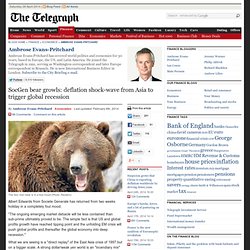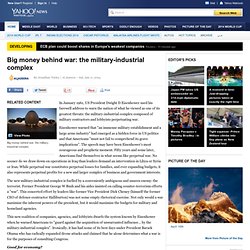

SocGen bear growls: deflation shock-wave from Asia to trigger global recession. The Soc Gen bear is in a foul mood (Photo: Reuters) Albert Edwards from Societe Generale has returned from two weeks holiday in a completely foul mood.

"The ongoing emerging market debacle will be less contained than sub-prime ultimately proved to be. The simple fact is that US and global profits growth have reached tipping point and the unfolding EM crisis will push global profits and thereafter the global economy into deep recession. " What we are seeing is a "direct replay" of the East Asia crisis of 1997 but on a bigger scale. A strong dollar/weak yen world is an "incendiary mix" for emerging markets. Analysts are slashing their forecasts at an "all-time record rate – this is wholly inconsistent with talk of economic acceleration".
"The dire profits situation will only get worse as EM implodes and waves of deflation flow from Asia to overwhelm the fragile situation in the US and Europe. " EM profits have been negative for two years already. I could go on, If I were a Scot, I might vote yes to independence. As it is, I can only plead with them to stay. Even before David Cameron had opened his mouth, a Scottish friend of mine got in touch.

"Today reminds me of an old joke," his email began, "about a pilot announcing that he'll have to make an emergency landing in the sea. Panicked passengers ask the flight attendant where the life vests are. 'Oh,' says the flight attendant, 'so now you're interested.'" For Scots, especially those who have grappled with the question of home rule for 35 years or more, the British prime minister and the rest of the London political class have left it awfully late to start paying attention now.
With just seven months to go till Scots vote yes or no to independence, the rest of the United Kingdom is like a husband whose wife has been threatening divorce for three decades – but waits till she's got a suitcase in her hand and her coat on before looking up from the couch to say: "Can't we talk about this? " It's odd, this reaction. It's not about blue-faced loathing of Sassenachs. Big money behind war: the military-industrial complex. In January 1961, US President Dwight D Eisenhower used his farewell address to warn the nation of what he viewed as one of its greatest threats: the military-industrial complex composed of military contractors and lobbyists perpetuating war.

Eisenhower warned that "an immense military establishment and a large arms industry" had emerged as a hidden force in US politics and that Americans "must not fail to comprehend its grave implications". The speech may have been Eisenhower's most courageous and prophetic moment. Fifty years and some later, Americans find themselves in what seems like perpetual war. No sooner do we draw down on operations in Iraq than leaders demand an intervention in Libya or Syria or Iran.
While perpetual war constitutes perpetual losses for families, and ever expanding budgets, it also represents perpetual profits for a new and larger complex of business and government interests. Good for economy? The contractors The lobbyists The agencies Symbiotic relationship. Saudi isolation could be a threat to the region. The simmering split between Saudi Arabia and its Western allies over key foreign policy questions, mainly Syria and the Iranian nuclear negotiations, was publicly consecrated in a recent op-ed penned by Saudi Ambassador to Britain, Prince Nawaf bin Abdulaziz al-Saud.

In it, he claimed that Saudi Arabia "will go it alone" in their policies towards Iran and Syria as their "Western partners have refused to take much-needed action against them". Prince Nawaf's attempt to capture the moral high ground on the Syrian and Iranian issues conceals the Kingdom's growing isolation from the regional geopolitical scene. This isolation has manifest in increasingly tense relations with Western allies that have prompted calls for rethinking Saudi-Western relations and a growing distance between Saudi and its Arab Gulf neighbours on the Syrian and Iranian issues. Geopolitical woes Geopolitical developments in the region seem to be passing Saudi Arabia by. Consequences of isolation.